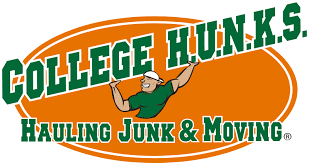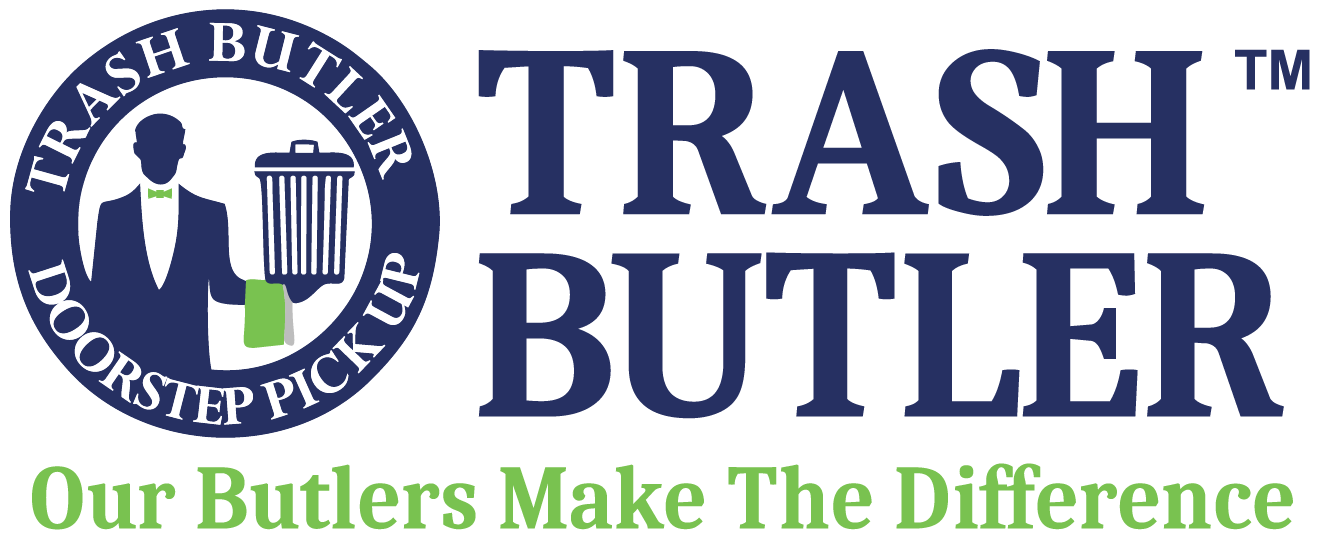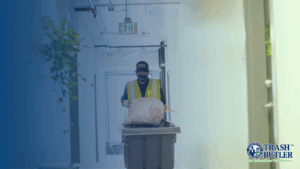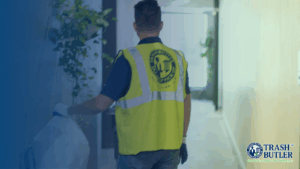Trash piling up like a forgotten chore can turn any property into a dumping ground. But for landlords, trash removal isn’t just about keeping curb appeal—it’s a legal and logistical necessity from navigating local ordinances to maintaining tenant satisfaction.
As a landlord or property manager of a multi-family apartment community, it is crucial to understand your responsibilities regarding trash removal. Proper waste management ensures the property’s cleanliness and aesthetics and contributes to the overall well-being of your residents and the environment.
This article explores the essential responsibilities landlords need to know to keep their properties clean, compliant, and community-friendly.
Understanding Trash Removal Responsibilities
Grasping the concept of trash removal responsibilities is paramount for landlords seeking to maintain pristine living conditions for their tenants. It involves providing tenants with designated trash bins, arranging regular pickup services through local waste management companies, and ensuring compliance with municipal regulations and lease agreements. Failure to uphold these responsibilities can result in health hazards, code violations, and strained tenant-landlord relationships.
Effective communication with tenants about proper waste disposal practices, promptly addressing trash pickup or bin maintenance issues, and staying informed about local ordinances are vital for successful trash removal management.
Is The Landlord Responsible For Trash Removal?
Yes, in most cases, the landlord is responsible for trash removal in rental properties. Landlords have specific legal obligations regarding trash removal to maintain habitable living conditions for their tenants and comply with local regulations.
These obligations typically require landlords to provide adequate trash removal services, including supplying trash bins, arranging regular pickup services, and ensuring proper disposal practices. Legal requirements may vary depending on the jurisdiction, but landlords are generally expected to keep the rental property clean and free from health hazards related to waste accumulation.
Failure to fulfill these obligations can result in penalties, fines, or legal action from local authorities. Therefore, landlords must understand and adhere to the legal requirements regarding trash removal to ensure the well-being of their tenants and avoid potential legal consequences.
Critical Considerations In Lease Agreements For Trash Removal
Regarding lease agreements in multi-family apartment communities, the responsibilities for trash removal can vary. Landlords and tenants must clearly understand who is responsible for managing and disposing of trash to ensure a clean and well-maintained living environment. Here are some key considerations to keep in mind when it comes to trash removal in lease agreements:
- Explicitly Stated Responsibilities: Lease agreements should clearly outline the responsibilities of both the landlord and the tenant regarding trash removal. Landlords may specify if they provide a valet trash service or if tenants are responsible for disposing of their trash in designated areas.
- Trash Collection Schedule: The lease agreement should include details about the trash collection schedule for the community. This includes information on the days and times when trash should be placed outside for pickup to avoid any confusion or violations of community rules.
- Proper Disposal Guidelines: It is essential to include guidelines on how trash should be properly disposed of to prevent issues such as odors, pests, or overflowing bins. Tenants should be informed about recycling practices and any specific rules related to trash disposal.
- Additional Services: Some lease agreements may include provisions for additional trash removal services, such as bulky item pickups or hazardous waste disposal. Landlords should communicate clearly if such services are provided and any associated costs.
- Consequences of Non-Compliance: In cases where tenants fail to adhere to the trash removal guidelines in the lease agreement, consequences should be outlined, such as fines or penalties for violations.
Arranging Trash Pickup Services: What Landlords Should Know
Local Regulations and Requirements
Landlords should familiarize themselves with local regulations and requirements regarding waste management and trash pickup services. This includes understanding any ordinances or laws governing trash collection schedules, recycling mandates, and disposal methods specific to their area.
By staying compliant with local regulations, landlords can avoid potential fines or penalties and ensure proper waste handling on their property.
Choosing The Right Service Provider
Landlords should carefully research and vet potential trash pickup service providers before deciding. Consider factors such as the provider’s reputation, experience, service offerings, pricing structure, and reliability.
Requesting quotes from multiple providers and requesting references from other property managers can help landlords make an informed choice that meets their property’s specific needs and budget.
Service Agreement Terms And Conditions
Before finalizing arrangements with a trash pickup service provider, landlords should thoroughly review the terms and conditions of the service agreement. Pay close attention to details such as the duration of the contract, service frequencies and schedules, billing methods, cancellation policies, and any additional fees or charges.
It’s essential to clearly understand the contractual obligations and ensure they align with the property’s requirements and budget constraints.
Communication And Coordination
Effective communication and coordination between landlords, tenants, and the trash pickup service provider are essential for smooth operations. Landlords should establish clear communication channels with the service provider and communicate trash collection schedules, guidelines, and special instructions to tenants.
Providing tenants with written information, such as flyers or emails, can reinforce expectations and ensure compliance with waste management protocols.
Educating Tenants
Landlords are crucial in educating tenants about proper waste disposal practices and adhering to trash pickup schedules. This includes providing guidance on sorting recyclables, disposing of bulky items, and reporting any issues or concerns related to trash collection. Landlords can also encourage tenants to minimize waste generation through initiatives such as composting, reusable packaging, and donation programs.
Educating Tenants On Proper Trash Disposal Practices
Proper trash disposal is a responsibility and a collaborative effort between landlords, property managers, and tenants. To maintain a clean and healthy living environment, educating tenants on the importance of following proper trash disposal practices is crucial. Here are some key points to consider when educating tenants:
Sorting And Recycling
Encourage tenants to separate their trash into recyclables and non-recyclables. Provide clear guidelines on what can be recycled and where recycling bins are located on the property. Educate tenants on the environmental benefits of recycling and how it contributes to sustainability efforts.
Bagging And Securing Trash
Emphasize the importance of bagging trash properly to prevent spills and littering. Recommend using sturdy trash bags and tying them securely before placing them in designated pickup areas. Remind tenants to avoid overfilling trash bags to prevent breakage and ensure easy handling for trash collectors.
Proper Disposal Of Large Items
Inform tenants about the proper procedures for disposing of large items such as furniture, appliances, or electronic waste. Guided scheduling of special pickups for bulky items or coordinated with property management for proper disposal options.
Reporting Maintenance Issues
Encourage tenants to promptly report any malfunctioning trash chutes, overflowing dumpsters, or other maintenance issues related to trash disposal. Establish clear communication channels for tenants to notify management about any concerns to ensure a timely resolution.
By educating tenants on proper trash disposal practices, landlords and property managers can foster a sense of community responsibility and maintain a clean living environment for all residents. Effective communication and collaboration between all parties involved are essential to ensure the success of waste management practices in multi-family apartment communities.
Maintenance And Inspections: Ensuring Proper Trash Removal
As a landlord or property manager, staying on top of maintenance and conducting regular inspections is crucial in ensuring proper trash removal within your multi-family apartment community. Here are some key responsibilities and best practices to consider:
Trash Collection Schedule
Establishing a consistent and convenient trash collection schedule is essential for maintaining cleanliness and order within your property. Communicate this schedule to your residents and ensure that all trash bins are easily accessible and emptied regularly to prevent overflow and potential sanitation issues.
Monitoring Common Areas
Regularly inspecting common areas such as hallways, parking lots, and shared spaces can help identify trash buildup or improper disposal practices. Addressing these issues promptly not only maintains the aesthetics of your property but also promotes a clean and healthy environment for residents.
Providing Adequate Trash Receptacles
Ensure that your property has sufficient trash receptacles placed strategically throughout the premises. This helps residents dispose of their trash conveniently and reduces the likelihood of littering or improper disposal. Regularly empty and clean these receptacles to prevent odors and attract pests.
Educating Residents
Educate your residents on the importance of proper trash disposal, recycling practices, and community guidelines regarding waste management. Clear instructions and resources can foster a sense of responsibility and encourage compliance with trash removal policies.
Partnering With A Valet Trash Service
Consider partnering with a professional valet trash service like Trash Butler™ to streamline the trash removal process and enhance the overall cleanliness of your property. Valet trash services offer doorstep collection, recycling solutions, and additional amenities that can elevate the resident experience and simplify trash management for property staff.
Trash Butler: Simplifying Waste Management With Valet Trash Services
Trash Butler™ is the leading name in sustainable waste management solutions for multi-family apartment communities. With our innovative doorstep valet trash service and recycling program, we take the hassle out of waste disposal for both residents and property managers.
Our valet trash service is designed to streamline the waste management process and ensure a clean, attractive living environment for residents. Our dedicated team of Butlers collects residents’ trash right from their doorstep, eliminating the need for residents to trek to the dumpsters themselves. This convenience saves residents time and effort and helps maintain a tidy community where waste is appropriately managed.
By partnering with Trash Butler™, property managers can enhance the overall living experience for their residents. Our reliable and professional Butlers are trained to provide top-notch service, ensuring trash is collected efficiently and complies with community guidelines. This level of service not only adds value to the property and contributes to resident satisfaction and retention. Contact us today or request a quote to experience the ease and affordability of our solutions.
Final Thoughts
Landlords must understand their responsibilities regarding trash removal in multi-family apartment communities. While laws and regulations may vary depending on the location, landlords are generally responsible for providing adequate waste disposal solutions for their tenants. This includes ensuring designated trash collection areas, arranging regular pickup services, and maintaining cleanliness and order in common areas.
Remember, maintaining a clean and well-managed property benefits tenants and reflects positively on the landlord’s reputation and property value.
Try Trash Butler™ today and experience hassle-free waste management for your rental properties! Get started now to enjoy efficient pickups, reliable service, and satisfied tenants. Contact us today to learn more about our valet waste services. Let us handle the dirty work while you and your tenants enjoy a cleaner, more convenient living environment.
Additional Read:
- The Benefits Of Valet Trash Services For Apartment Complexes
- Top Must-Have Amenities For Apartment Complexes
- Trash Butler’s Green Initiative: Pioneering Eco-friendly Valet Trash Services
Frequently Asked Questions on Trash Removal Responsibilities for Landlords
Can landlords include trash removal costs in the rent?
Yes, landlords can include trash removal costs in the rent. This allows for a seamless experience for tenants, making it easier for them to manage their finances without worrying about additional utility bills. Landlords need to communicate this inclusion in the lease agreement to ensure transparency.
What happens if tenants fail to dispose of trash properly?
If tenants fail to dispose of trash properly, landlords can address the situation by reminding tenants of their responsibilities outlined in the lease agreement. Continuous violations may result in fines or additional charges and, in severe cases, may be grounds for eviction according to local regulations.
Can landlords charge tenants for excessive trash removal or cleanup?
If the lease agreement stipulates, landlords can charge tenants for excessive trash removal or cleanup. Landlords must define what constitutes “excessive” and ensure tenants know the potential charges they could incur.
What should landlords do if tenants report issues with trash removal services?
When tenants report issues with trash removal services, landlords should promptly address these concerns by contacting the service provider to resolve the issue. Ensuring a quick response not only maintains a good landlord-tenant relationship but also upholds the cleanliness and hygiene of the property.
Can landlords provide additional trash bins for tenants if needed?
Landlords can provide additional trash bins for tenants if needed, especially when the current provisions are insufficient. This can help prevent overflow and maintain a clean environment for all residents.
Are there any penalties for landlords who fail to fulfill trash removal responsibilities?
Landlords who fail to fulfill their trash removal responsibilities may face penalties, which vary by local laws and ordinances. These can include fines and possibly legal action if the negligence leads to health or safety issues.
Can tenants request changes to trash removal services provided by the landlord?
Tenants can request changes to the trash removal services provided, although landlords are not obligated to honor every request. However, accommodating reasonable requests can improve tenant satisfaction and retention.
Should landlords provide guidelines for disposing of specific types of waste, such as electronics or furniture?
Yes, landlords should provide guidelines for disposing of specific types of waste, such as electronics or furniture. This information can help ensure proper disposal practices are followed, benefiting the environment and the community.
Are there any resources available to help landlords with trash removal responsibilities?
Numerous resources are available to help landlords with trash removal responsibilities. These include municipal guidelines, waste management companies, and services like Trash Butler™, which offer comprehensive solutions tailored to multi-family apartment communities.
What should landlords do if they have questions or concerns about trash removal responsibilities?
Suppose landlords have questions or concerns about their trash removal responsibilities. In that case, they should consult local regulations, waste management professionals, or companies like Trash Butler™ for expert advice and support. This proactive approach can help address uncertainties and ensure compliance with all trash removal requirements.





